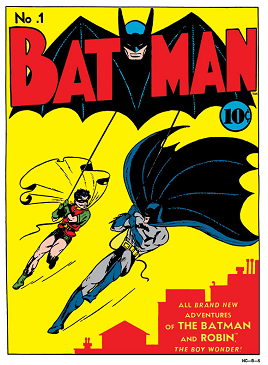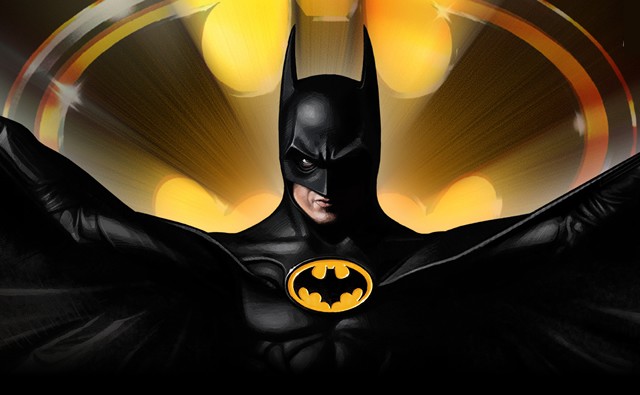
He is known by many names; the Batman, The Caped Crusader, The Dark Knight. But before this icon of American comic book illustration was created by Bob Cane 75 years ago this week in 1939, the ideal male superhero was a somewhat cliché even at such an early juncture in the genre’s history.
Prior to the advent of The Bat, Superman and Captain Marvel were the earmark of what a superhero was supposed to be. Both the aforementioned characters were super men in every sense of the term. They both were capable of feats that no mortal man could ever hope to accomplish. In Batman, fans found a character that was less than super but more than a man. Born Bruce Wayne to billionaire parents Dr. Thomas Wayne and wife Martha, Batman would witness the murder of his mother and father at the hands of a robber. This act of senseless violence would transform him at an early age and dedicate the rest of his life to honing his body and mind into a weapon against the dark forces.
He is in peak physical and mental condition, in possession of genius level intellect, a master escape artist, strategist, tactician, swordsman and marksman. Batman is also an elite master of disguise and stealth, with his deep pockets being able to fund his access to the most state-of-the-art gadgets in the world. The tenets of this imaginary character give genuine insight into the belief systems of the powerless and the downtrodden. They say that justice is blind, but those who have been disproportionately burned by the letter of the law would beg to differ. Though Batman is a vigilante who seldom relies on law enforcement to capture the criminals, he does believe in allowing the court system to do its job. As is the case in real life law enforcement, the situation is sometimes hit or miss.

This dichotomy has been revisited time and time again with Batman’s primary nemesis the Joker. The Joker’s primary goal in life is destruction for the sake of it. However, his level of insanity is such that he is often related to Arkham Asylum for the Criminally Insane despite having killed hundreds if not thousands of people in the DC Universe. Batman and The Joker exist as a ying and yang. One for justice and order, the other for destruction and mayhem.
Batman is the illustrated embodiment of the righteous and vigilant few. His ideological roots are spread throughout world history in such vigilante acts as the Massachusetts Minutemen of the Revolutionary War, the French Resistance of World War II, and the Black Panther Party for Self-Defense in the 1960s. But society decides who is righteous in their vigilance and who is criminal.
The militant-leaning Black Party for Self-Defense was created in Oakland, California in 1966 to counteract and prevent police brutality against African-American males. Though their open display of weaponry was initially legal in the state, the laws were changed because the establishment considered their actions threatening to the status quo. Then Governor Ronald Reagan may have believed he was being vigilant in changing California gun laws, but the Panthers would likely disagree.

Art imitates life with this Reagan move paralleling to fictional comic book laws like The Mutant Registration Act and the Mutant Control Act. For Batman and other DC Universe characters, the attempted governmental oversight occurred in 1951 when the Justice Society of America refused to unmask themselves in front of the House of Un-American Activities Committee, illustrated in "Adventure Comics" #466 (1979).
But this isn't the only real life history chapter that can be paralleled to Batman. In the 1984 case of Bernard Goetz in the New York City subway, Goetz, who had been previously mugged, bought a .38 caliber handgun. And when accosted by five African-American men, he fired shots, striking all of them, paralyzing one and killing another. White conservatives framed him as a hero who defended himself against those who were trying to rob him. While liberals said Goetz got on the train looking to start a confrontation, before stalking and shooting the men he claims tried to rob him. Served eight months of a 1-year sentence, some still ask, "Was Goetz in the right?" Only he and his victims know for certain. However, the heart of the vigilante does not beat for the letter of the law. Like a Batman mindset, it only beats for what’s right and sometimes that very idea runs opposite to what truly is proper from a sociological context.

The inability of the establishment to fight internal corruption has long been a trope used in the Batman comic book series and other related titles, as countless members of the Gotham City Police Department have been involved in such nefarious acts as drug-trafficking, bribery and murder over the years. It is for this reason that Batman only chooses to work with Commissioner James Gordon, one of the few he can trust. Batman goes back and forth from welcomed ally to most wanted criminal throughout the 75-year storyline. Again, the comic book reflects the real life phenomenon of ever changing politics deciding what is right and what is wrong in the public eye.
As is the case with anything worth fighting for, the Dark Knight has made sacrifices, leading to those he has affiliated himself with dying (Blue Beetle, Batwoman, Jason Todd aka Robin) or being scarred for life. The Bat himself has had every bone in his body broken at one time or another.
But this is what vigilantes do. The line between the righteous and rebellious criminal is as blurry in real life as it is in the illustrated pages of comic books. What’s in the heart of the observer often dictates the category he places the vigilante in.
Batman has run afoul of the law more often than any so-called hero that we can think of. And has often drawn the ire of his fellow heroes in the Justice League as well. But that didn’t matter to The Bat. Only the pursuit of righteousness by way of subduing those believed to be wicked. In real life, as in the comic books, the appeal of the vigilante is as intriguing as it is potentially divisive. That’s why we love Batman. He is complicated, brooding and doesn’t give a damn about what anyone thinks. Doing what he feels is right, the Bat's very existence harkens to a distinctly American dialogue where beliefs are worth fighting for, even if it means breaking the law as well.
Happy 75th Birthday Batman.



